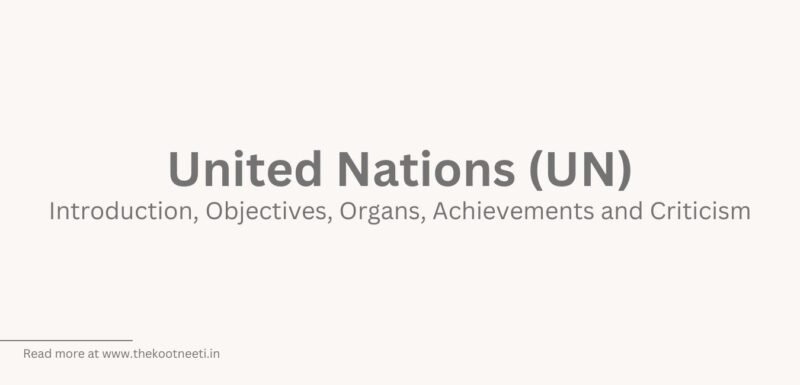United Nations (UN): Introduction, Objectives, Organs, Achievements and Criticism

Introduction
The United Nations (UN) is an international organization that was established in 1945 with the goal of promoting international cooperation and addressing global issues. The UN has 193 member countries and works to promote peace, protect human rights, and provide humanitarian assistance. It plays a vital role in addressing global challenges and promoting international cooperation. Its work includes peacekeeping operations, humanitarian assistance, arms control, and the promotion of human rights and sustainable development.
Main Organs
The United Nations (UN) is composed of six main organs:
- The General Assembly: This is the main deliberative body of the UN and is composed of representatives from all member states. The General Assembly meets once a year in a regular session and additional special sessions can be held as necessary. The General Assembly is responsible for discussing and coordinating on a wide range of international issues, and for making recommendations on international issues to the other UN organs and to member states.
- The Security Council: This body is responsible for maintaining international peace and security. The Security Council has the power to take collective action, including the use of force, to maintain peace and security. The Security Council is composed of 15 members, 5 of which are permanent members (China, France, Russia, the United Kingdom, and the United States) and 10 are elected for two-year terms.
- The Economic and Social Council: This body is responsible for promoting international economic and social cooperation and development. It is composed of 54 members and it works with the specialized agencies of the UN system, such as the World Bank, the International Monetary Fund, and the World Health Organization.
- The International Court of Justice: This is the main judicial body of the UN and is also known as the World Court. The Court settles legal disputes submitted to it by states and gives advisory opinions on legal questions referred to it by the General Assembly, the Security Council, and other UN organs.
- The Secretariat: This is the administrative body of the UN and is responsible for carrying out the day-to-day work of the organization. The Secretariat is headed by the Secretary-General, who is appointed by the General Assembly on the recommendation of the Security Council.
- The Trusteeship Council: This body was established to oversee the administration of trust territories, which were territories that were under the administration of a UN member state (trustee) on behalf of the international community. The Trusteeship Council was dissolved in 1994 after the last trust territory, Palau, became independent.
The UN has several main objectives, including:
- Maintaining international peace and security: The UN’s primary responsibility is to maintain international peace and security. This includes preventing and resolving conflicts, as well as taking collective action to maintain peace and security in the face of threats to international peace and security, such as acts of aggression or terrorist attacks.
- Promoting and protecting human rights: The UN is responsible for promoting and protecting human rights, including the rights of women and children, and promoting social and economic development.
- Providing humanitarian assistance: The UN is responsible for providing humanitarian assistance to those in need, including refugees and internally displaced persons.
- Promoting sustainable development: The UN works to promote sustainable development and reduce poverty, through programs such as the Sustainable Development Goals (SDGs).
- Facilitating international cooperation: The UN serves as a forum for nations to cooperate on a wide range of issues, including economic and social development, environmental protection, and disarmament.
- Representing collective interests: The UN is representative of the international community and coordinates collective action to address global issues.
- Providing peacekeeping: UN peacekeeping forces are deployed to help countries maintain peace and security in regions affected by conflict.
- Promote rule of law: the UN works with countries to strengthen the rule of law, including through programs that promote human rights, democracy and justice.
Notable works by the UN
The United Nations (UN) has been involved in a wide range of activities and initiatives over the years, and has made significant contributions to addressing global challenges and promoting international cooperation. Some notable works of the UN include:
- Peacekeeping: The UN has deployed peacekeeping missions to a number of countries around the world in an effort to help restore peace and stability in areas affected by conflict. These missions have helped to reduce violence and protect civilians, and have played a critical role in promoting dialogue and reconciliation.
- Humanitarian assistance: The UN provides humanitarian assistance to people affected by natural disasters, armed conflict, and other crises. This includes providing food, shelter, and other basic needs to people in need, as well as supporting the reconstruction of infrastructure and the delivery of health and education services.
- Development: The UN works to promote sustainable development and reduce poverty around the world. This includes initiatives to improve health and education, promote gender equality, and support economic growth and job creation.
- Environmental protection: The UN has played a key role in promoting international cooperation on environmental issues and has helped to raise awareness about the importance of protecting the environment. The organization has also supported efforts to address climate change, including through the negotiation of international agreements such as the Paris Agreement.
- Human rights: The UN has played a leading role in promoting and protecting human rights around the world. This includes the development of international human rights standards and the promotion of human rights education and awareness. The organization has also supported efforts to hold accountable those who violate human rights.
Criticism of the UN
The United Nations (UN) is a complex international organization that has been subject to criticism from various quarters. Some of the main criticisms of the UN include:
- Ineffectiveness: The UN has been criticized for its inability to effectively address some of the most pressing global challenges, such as armed conflict, terrorism, and human rights abuses. Critics argue that the organization lacks the necessary resources and political will to effectively address these issues.
- Lack of enforcement powers: The UN is a voluntary organization and relies on the cooperation of member states to implement its decisions. This has led to criticism that the UN lacks the necessary enforcement powers to effectively address issues such as non-compliance with international law and the failure of states to honor their commitments.
- Bureaucracy: The UN is a large and complex organization with a bureaucracy that has been criticized for being inefficient and slow to respond to crises.
- Lack of accountability: The UN has been criticized for its lack of transparency and accountability, particularly in regards to its financial management and the use of its resources.
- Political bias: The UN has been accused of being biased in favor of certain member states or groups of states, and of being swayed by the interests of the more powerful countries.
- Inequality: Some critics argue that the UN is not representative of the global community, as the decision-making bodies of the organization are dominated by a small group of powerful states. This has led to concerns about the lack of representation and voice for smaller and poorer countries.
India and the United Nations
India is a founding member of the United Nations (UN) and has been an active participant in the organization since it was established in 1945. India is one of the five permanent members of the UN Security Council and has played a significant role in the maintenance of international peace and security.
India has contributed troops and other resources to a number of UN peacekeeping operations around the world and has also played a leading role in the development of UN peacekeeping doctrine. The country has also been an active participant in the UN’s efforts to address global challenges, such as climate change, poverty, and inequality.
India has used its membership in the UN to promote its national interests and to advocate for the interests of developing countries. It has played a key role in shaping the UN’s agenda on issues such as disarmament, non-proliferation, and sustainable development.
Overall, India’s participation in the UN has helped to promote international cooperation and to address global challenges.


















